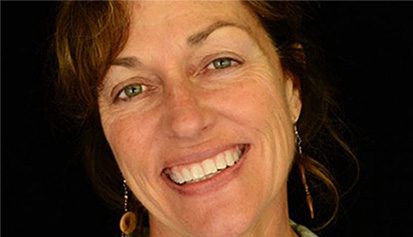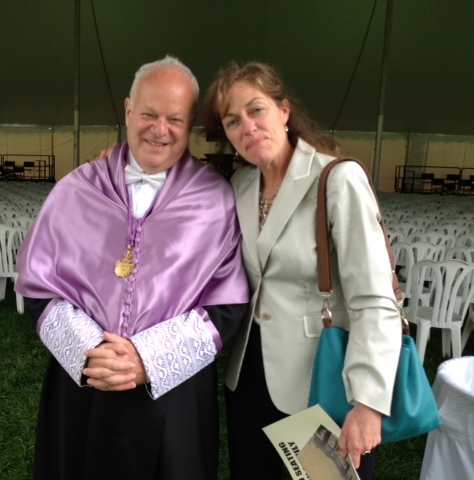Martin Seligman, the “Father of Positive Psychology,” has Albany Roots
By Mary Judd Special To The Times Union Published: 01:18 a.m., Saturday, October 16, 2010
This past spring, Albany Academy presented a Distinguished Alumni Award to Martin Seligman, who graduated in 1960. This child of Albany went on to become one of the world’s foremost psychologists. He is a world leader in the study of mental illness, and his discovery of “Learned Helplessness” changed the landscape of therapy treatments forever, and eventually led to the study of “Learned Optimism.” Today, Seligman is considered the father of positive psychology, the study of “what goes right with people.” He serves as the Fox Leadership Professor of Psychology at the University of Pennsylvania and is founder and director of the university’s Positive Psychology Center, the first in the world. He’s also the author of numerous studies and best-selling books such as “Learned Optimism,” “The Optimistic Child” and “Authentic Happiness,” and his research and resulting work from others is cited frequently around the world. His newest book, “Flourishing,” is expected to be published next spring.
Q: How did your time in Albany shape the man you are today?
A: My days at Albany Academy were not unlike those of many teenagers. Although I appreciated the opportunity to study at such a beautiful location, with great faculty and classmates, I suffered the usual share of angst and insecurities. I made some very dear friends, many of whom I still keep in touch with today, and I excelled in my classes but was an ineffective member of the battalion. The academy of my day was a zero-sum game: highly competitive, and for every winner there was a loser. I knew then that many of my skills and talents were left untapped. I was aware of the complexities of human behavior then, and my interest only grew.
Q: When did you know you wanted to be a psychologist?
A: As a philosophy major at Princeton, I enjoyed studying the great thinkers, past and present. As I tried to decide between advanced study in philosophy or psychology, one of my professors in the cruelest and kindest advice I ever got said to me, “Philosophy is good training … for something else.” I knew I could excel at psychology.
Q: After decades of studying depression, how did you become known as the “Father of Positive Psychology?”
A: When I was elected as the president of the American Psychological Association, I knew I needed to advance the field. We were well versed in the mental illnesses, and I was known for identifying our ability to learn to become depressed and helpless. But, as a field, what did we really know about learning to become optimistic and proactive? To flourish? I remember a day when I was pulling weeds in my rose garden. I noticed my daughter tossing the neatly piled, just-pulled weeds all around the yard. I scolded her. She stopped and looked me straight in the eye and said, “Daddy, remember when I used to whine all the time? Well, when I turned 5, I decided to stop whining. If I could stop whining, then you can stop being such a grump.” Her words stopped me in my tracks. She was right. I knew the reasons for my grumpiness, but how to turn it around? I knew then Nikki was on to something. It was time for psychology to seriously study the other half of the human story: what goes right with us. Positive psychology involves learning to think differently about both good and bad events, and appreciating that there is more than one path to an emotionally satisfying life.
Q: Why do you feel the study of positive psychology is so important?
A: We are witnessing an epidemic of depression. Fifty years ago, the average age of onset was early 30s. Today, the average age is 15. We humans were meant to thrive. Each of us wants to live our best life. By studying what makes some of us stronger, happier and more satisfied than the norm, we can better understand how to boost ourselves, and others, when we want or need to. Many of us are naturally prone to negativity. As humans, we have natural survival skills that depend on negative emotions, like fear and anger, to ward off harm. We all know that it is often hard to bounce back from negative experiences, and that it takes strength to be resilient. By studying the strengths that are at play in people who thrive, who resist downward spirals or know better how to handle them, we gain knowledge that empowers us all.
Q: What kind of research is being conducted, and how is it being used?
A: We are familiar with the effects of negative emotions. With this new research, we are gathering unprecedented information about the effects of positive emotions in areas from health — such as preventing post-traumatic stress disorder and recovery from heart attacks — to academic performance, resiliency, creativity, open-mindedness, goal attainment and much more. By looking at what triggers positive responses and what the effects are, we can better understand what people are searching for and if it aligns for a life of authentic happiness. We find that the more positive exchanges one has, the better social interactions, use of their strengths and opportunities to connect to “something larger than oneself,” the better one feels about life. We are studying how to identify and maximize strengths to increase positive occurrences. We are studying positive institutions to identify what makes them thrive.
Q: What do you say to those who feel this is too much emphasis on the positive, that negative emotions and pessimism have a place, too?
A: We all are very aware of the existence of the negative, and how common it is to dwell on the negative, often at great cost to health and well being, to productivity, relationships and more. As I said earlier, evolution has created a privileged place for negative emotions and pessimism. But this current research is leading to a new wealth of tools to address many of our problems.
Q: How will your work affect our lives in Albany?
A: The Albany Academies are considering applying my strengths-based, resilience-building, positive education program within the academies. Schools in Australia and the UK are basing their curricula around positive education. It would be gratifying if the Albany Academies became the first major school in America to adopt and brand positive education. This will have a tremendous impact on the students, the school and the community.
Q: What are you working on now?
A: My newest book, “The Search for Well Being,” picks up where the others left off, with updated research findings and applications. It offers more insight into what we call “the good life” and how we can continue to expand the number of people who are flourishing in our world. I find tremendous meaning and purpose in this work.

